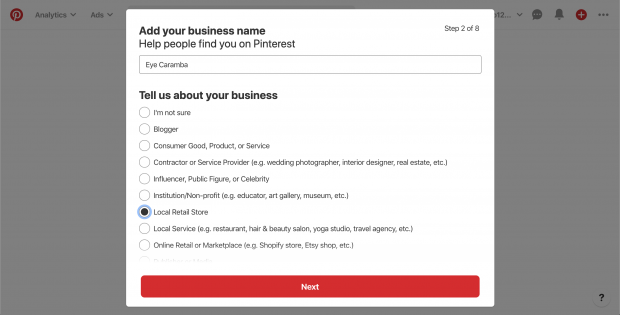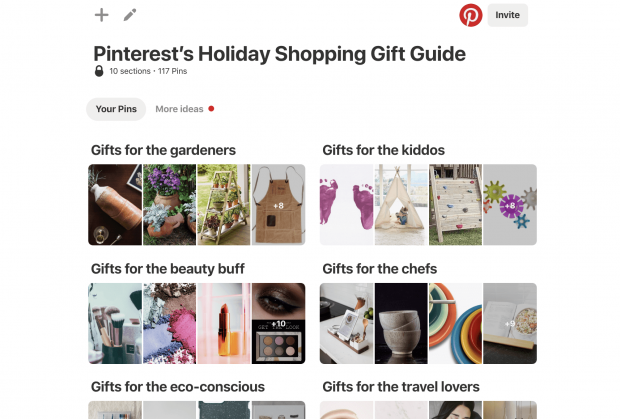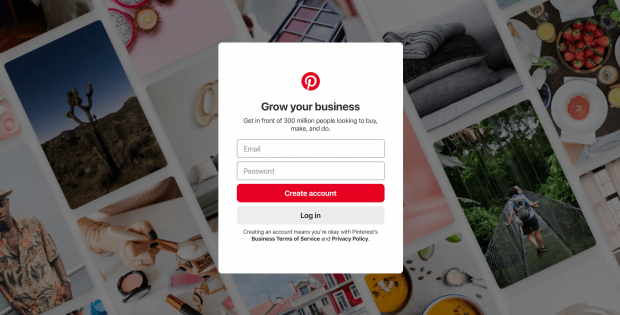Are you currently using Pinterest for business? If not, it might be time to put some stock into the idea—especially now that the company has gone public under the very apropos ticker “PINS.”
Pinterest offers businesses a fairly unique proposition. Like other social media networks, it’s a place to connect with friends and influencers. But as a visual search engine and “productivity tool for planning your dreams,” it’s also a lot more than that.
Pinners come to the platform for inspiration—or “Pinspiration.” They’re planning their weddings, dream vacations, and holiday dinners. And because of that, they’re not only receptive to brand content—they find it helpful.
This article will cover all the Pinterest for business basics to get you going, including:
- Why Pinterest may be right for you
- Important Pinterest lingo you should know
- How to set up a Pinterest business account
- How to multitask and use Pinterest with Hootsuite
- 8 strategies that will help your business find success
Let’s get started.
Why use Pinterest for business?
These are some of the top reasons Pinterest marketing may be right for your company.
Pinterest is the fourth most popular social media platform in the United States.
It ranks ahead of Twitter, LinkedIn, Whatsapp, and Snapchat. Approximately 28% of US adults have a Pinterest account. That’s more than one in every four people, and one in two US millennials (according to proprietary user data from Pinterest).
Pinterest has a strong global footprint, too.
From 2018 to Q3 2019, the platform’s international base of monthly active users grew 38%, from 171 million to 235 million.
More people are using Pinterest than ever.
Since last year, the number of Pinners using Pinterest every month increased 28% to 322 million monthly active users.
Visual search is on the rise.
As a “visual discovery engine,” Pinterest is the only social media platform to offer visual search. That’s huge, since 62% of Gen Zers and millennials say they’d like to be able to search by image. According to the company, Pinterest Lens can now identify more than 2.5 billion home and fashion objects.
Pinterest is popular with women—especially moms.
More than two-thirds of Pinterest’s base is women. In the United States, 8 in every 10 moms is on the platform. And when it comes to buying household products and services, women are the primary decision makers.
People use Pinterest to shop.
Some 84% of weekly users use Pinterest to help decide what to buy. According to Pinterest, 55% of Pinners are specifically looking for products. And 83% of weekly users have made a purchase based on content they see from brands on Pinterest.
Pins boost brand exposure.
Pinners like to discover new products. In fact, 75% of Pinterest users say they’re “very interested” in new products, compared with 55% on other digital channels. And it works. Some 77% of weekly users regularly discover new brands and products on Pinterest.
Pinterest inspires people.
People use Pinterest to search for ideas and plan for special events. Some 95% of members say Pinterest inspires them, and 91% say Pinterest helps them achieve their goals.
On Pinterest, your brand can be more than just a brand. Be a source of inspiration or play a more meaningful role for your customers in their daily lives.
Pinterest for business: important terms to know
Like every social media site, Pinterest has its own lingo. Consider this your glossary for all things Pinterest Business.
Pinner
LinkedIn has members, Instagram has ‘grammers, and Pinterest has Pinners. “Pinner” is the branded term for a person who uses Pinterest.
Pins
A pin is the primary type of post published on Pinterest. Pins include an image or video, text, and can link back to an original source.
RePins
A RePin occurs when someone pins a post they didn’t create to one of their boards.
Promoted Pins
Promoted pins are regular pins that companies have paid to promote. These pins appear in the home feed and search results and include a “Promoted” label. Promoted video pins, carousel, and app pins are also available. Learn more about Pinterest ad options.
Rich Pins
Rich Pins provide more information on the pin, from price information to install buttons. They are available in four formats: Product Pins, Recipe Pins, Article Pins, and App Pins.
Shop the Look Pins
With Shop the Look pins, businesses can add product tags to their creative. This makes it possible for Pinners to shop the look by tapping on the pin’s white dots. As of late 2019, Shop the Look ads are still being rolled out across the platform.
Boards
Pinterest boards are like a digital analog for mood boards. They are used to group pins around a certain theme or topic. For example, you might create a board to a product launch, or for seasonal content.
Group Boards
Group boards are the same as boards, except more than one person can add content. Most group boards—98%, in fact— have less than five members.
Secret Boards
A secret board can only be seen by its creator and invited collaborators. When you create one, you’ll see a lock symbol beside the board name. These are useful for planning you don’t want made public.
Protected Boards
Protected boards house promoted pins and are only available to advertisers. Pins on these boards can be seen across Pinterest, but the boards do not show on profile pages.
Save Button
The save button is a Pinterest browser plugin for Chrome, Firefox, or Microsoft Edge. You can install it on your website so that Pinners can save your products to their Pinterest boards.
Audience Insights
Pinterest business accounts have access to analytics via Audience Insights. Learn more about how to use the platform, and what metrics you should be tracking.
Pinterest Lens
Available on Android and Apple devices, Pinterest Lens is a camera tool that lets users take a picture or something and find related content on the site. It’s basically Shazam, but for images, underpinned by image recognition and machine learning tech.
Pincodes
Pincodes as essentially QR codes, or Pinterest’s version of Snapcodes. These can be scanned digitally, or on packages and displays, and link back to your board of profile.
How to set up a Pinterest business account
There are three ways to create a Pinterest business account. You can add a business profile to your personal account, convert your personal account, or create a new business account. We’ll show you how to start from scratch, since many of the steps that follow are the same.
1. Go to pinterest.com/business/create.
If you have a personal account, you’ll need to log out first. Enter your email and a new password, then click Create Account.
2. After choosing your language and location, add your business name.
Then choose the description that best fits what your business does and add a link to your website.


3. Connect your Instagram, YouTube, and/or Etsy accounts.
Doing so ensures pins from these sites will be attributed to your business. Plus, you’ll also be able to track related analytics.

4. Let Pinterest know if you plan to run ads on the platform.
You can also choose to provide contact information for a rep to get in touch.

5. Edit your profile.
To get there from the business hub dashboard, click the pencil icon beside your name. You may wish to change your profile name, since it automatically pulls from the email you use.
Add a profile photo that represents your brand. Dimensions should be 165 x 165 pixels. When you fill in the about section, try to include a few keywords. Click Done to save.

6. Click Claim in the left-hand menu to claim your website.
This will allow you to track website analytics. Also, any pins that link back to a claimed account include your profile photo and follow button. That means better visibility, and potentially more follows.

7. Create a Pinterest Board.
From you profile, click the plus sign over Create a Board. Add a descriptive title. After that, find the board on your profile and click the pencil icon.
Add a description that includes keywords.
Choose a category for your board. This helps with SEO.
Upload a fitting cover photo.

8. Create your first Pin.
From your dashboard, click the plus sign in the upper right corner.
Add a title and description. Be sure to include keywords and related hashtags.
Include a destination link. Test to make sure it works, and make sure it corresponds to the pin’s content.
Upload an image or video. You can crop, trip, and add logos and text in the Pin editor. Make sure you use a high quality file. Find the specs here.
Hit Publish and choose the board you want to add it to.

Pro tip: Consider installing the Pinterest save button. It helps to easily populate your boards with content from your website or elsewhere. Or try Pinterest Catalogs to turn products into pins all at once.
9. Choose a cover photo for you profile.
From your profile page, click the pencil icon above the image. Pinterest automatically fills it with creative from your pins or your boards. Pick either board or pin creative.
Soon business will be able to add videos to their covers.

10. Add the Pinterest Tag.
If you plan to advertise on Pinterest, you’ll want to add the Pinterest Tag to your website. This will allow you to track conversions and understand what people do on your site after seeing your pins.
Now that your Pinterest business account is set up, you’ll need to start attracting followers.
How to use Pinterest with Hootsuite
Hootsuite’s integration with Pinterest allows you to streamline your Pinterest marketing tasks. Whether you manage multiple accounts, team members, or social media channels, you can track everything directly from Hootsuite’s dashboard.
- Save time: Hootsuite allows you create and schedule Pins, and post them to multiple accounts at the same time.
- Improves teamwork: Ensure content is consistent across team members by sending pins for approval and using Hootsuite’s collaboration tools.
- Manage multiple channels: See you your Pinterest marketing efforts compare to you Facebook, Instagram, LinkedIn, YouTube, and Twitter marketing.
Using Pinterest for business: 8 tips and tactics
These tips and tactics will help you nail your Pinterest marketing strategy.
1. Create captivating content
Visuals speak volumes on Pinterest. In fact, in a Pinterest study, 85% of Pinners place more importance on visuals than text. But that doesn’t mean you should slack on your copy. Your pins should be designed to deliver on all fronts.
What makes a good pin?
- Vertical imagery. Exactly 85% of Pinners are on mobile. Shoot for a 2:3 aspect ratio so your image doesn’t get truncated, and aim for the highest quality.
- Descriptive copy. Tell people what they’re seeing, and entice them to want to learn more.
- Text overlay. Consider including a headline that reinforces your message.
- Tasteful branding. Include your logo your brand doesn’t get lost in the RePin shuffle.
- Good storytelling. Once you hook people in, show your brand in action. That way Pinners can imagine themselves as customers.
Dentyne
Glossier
Nike
L’Occitane
2. Pin consistently
Pinterest recommends to pin something once per day. This is more effective than creating a board and filling it up at once. Pinning regularly ensures your content will reach a wider audience.
You can schedule Pins on Pinterest or Hootsuite to ensure your account remains consistent. Take advantage of Audience Insights to determine when your content gets the most engagement. It’s always best to post when the bulk of your audience is online.
3. Plan ahead for seasonal content
Pinners like to plan ahead. Way ahead. That means brands have to be even better planners. Pinterest recommends sharing seasonal content 30-45 days in advance.
Seasons and holidays are big opportunities for brands. More than 56 million searches were made in 2018 for Valentine’s Day, 227 million for Halloween, and 321 million for December holidays.
Unsurprisingly, content that is timely sees a corresponding holiday boost. According to Pinterest, promoted pins that align with life moments and holidays see a 22% lift in online sales.
Look through Pinterest’s Seasonal Insights planner for inspiration. Pick holidays that your brand can create content around, and make sure to use the right keywords.

Tim Hortons, Valentine’s Day
Soda Stream, Christmas
Oreo, Thanksgiving
4. Use boards to connect with Pinners
Give Pinners a reason to follow your Pinterest Board. Create a series of tutorials or DIYs. Or curate a board filled with customers using your products.
On its Pinterest profile, cosmetic brand Glossier has separate boards for lip, brow, and other makeup ideas. There’s also a board filled with more than 150 makeup ideas. But it’s most popular board by far is a group board called BEAUTYCHAT.
As the company explains in its description, this board is a curated space for influencers and partners to share their beauty content. Rules for participation are clearly stated, including a limit on how many pins can be added per day.
The board now has more than half a million follows and more than 2,500 pins—over six times the amount of any other board.
Also, Pinterest recently rolled out new group board features, so you can easily react to posts group members share.
5. Optimize for Pinterest SEO
Pinterest is a visual search engine after all.
Just like any search engine, keywords are the basis for content discovery on Pinterest. This is why it’s important to use them in your company, board, and pin names and descriptions. Hashtags are also useful, especially since Pinners can follow the ones they’re interested in.
Beyond doing good keyword research, there are several things you can do to optimize for SEO on Pinterest. From pinning content from your website to boosting engagement, we provide the top ways to rank with Pinterest SEO.
6. Create a content strategy that delivers
Almost all Pinterest searches are non-branded. Some 97%, in fact. That means there’s lots of opportunity for brands to get discovered—especially when strong content and SEO strategies are in place.
Exposure is important, but a good content strategy needs to follow through. As Pinterest recommends, marketers should, “Build a strategy that takes consumers from awareness to purchase.” Once a Pinner shows interest, your content should take them through the marketing funnel, from interest to decision to action.

On Pinterest, brands should reconnect with engaged Pinners quickly. Findings from a recent Oracle Data Cloud study show that, when it comes to consumer packaged goods, Pinners were more likely to try a new product within 10 months of its launch.
The takeaway? “‘Heavy up’ on media at the beginning of the campaign,” says Pinterest.
7. Target the right Pinners with ads
Another effective way to follow through on Pinterest is with ads. Pinterest allows advertisers to target ads around keywords, interests, location, age, and other demographics.
Meanwhile, audience targeting lets advertisers reach the following groups:
- A customer lists, such as newsletter subscribers
- People who have visited your website
- People who have engaged with your Pins
- People who have engaged with similar content
Actalike audiences can also be created to help marketers find people similar to their customers. Just choose an existing audience as a source, and Pinterest will find like-minded Pinners for you.
Learn everything you need to know about Pinterest advertising.
8. Make it easy for Pinners to shop
Pinners, as we know, like to shop. So, make it easy for them.
One way to do this is with Shop the Look pins. These pins streamline the online retail process by allowing people to click on the specific home decor or fashion item that interests them. Links take them directly to the product page so that they can buy something immediately if they wish.
Pinterest also recently introduced a Shop tab for business profiles. This dedicated tab allows Pinners to shop a company’s products directly from their profile. While it’s still new, it shows promise to be an effective point-of-sale for businesses.


Remember, all your efforts on Pinterest can be improved by paying close attention to Pinterest Analytics. Stay on top of Audience Insights so you can plan and refine your work.
Save time managing your Pinterest presence using Hootsuite. From a single dashboard you can compose, schedule, and publish Pins, create new boards, Pin to multiple boards at once, and run all your other social media profiles. Try it free today.
Get Started
With files from Ana Gotter and Shannon Tien.
